Key takeaways:
- Understanding the various types of agents (literary, talent, commercial, etc.) is crucial for aligning with individual goals in the publishing industry.
- Utilizing online resources like databases, social networks, and tracking sheets can streamline the agent research process and enhance organization.
- Networking with industry professionals fosters valuable connections and insights, which can significantly impact the agent selection journey.
- Crafting a focused shortlist of agents based on specific goals and compatibility is essential for effectively navigating submissions and building relationships.
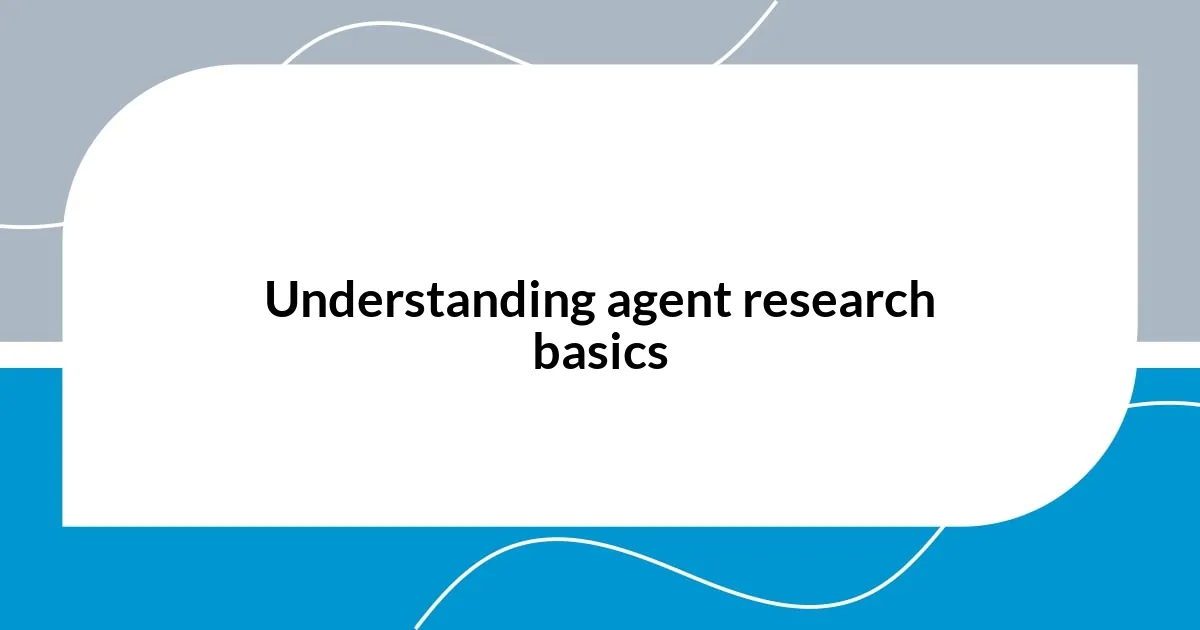
Understanding agent research basics
Understanding agent research starts with recognizing the different types of agents available in the industry. I remember feeling overwhelmed when I first encountered the variety of agents, from literary agents to talent agents. What struck me was how each type serves a unique purpose, often reflecting the specific needs of the projects or individuals they represent.
In my experience, diving into agent research meant sifting through countless resources like databases and forums. Each late-night Google search led me down rabbit holes of information, which at times felt like a maze without a clear exit. This process taught me that patience is essential; finding the right agent isn’t just about a name on a list but about connecting with someone who truly understands your work and vision.
It’s also crucial to understand the specific requirements agents have for submissions. What do they want to see in your query letter or project proposal? Reflecting on my own journey, I learned that tailoring my submissions to align with each agent’s preferences not only improved my chances of getting noticed but also made the process more personal and engaging. It’s about building a relationship, even before you’ve had your first conversation.
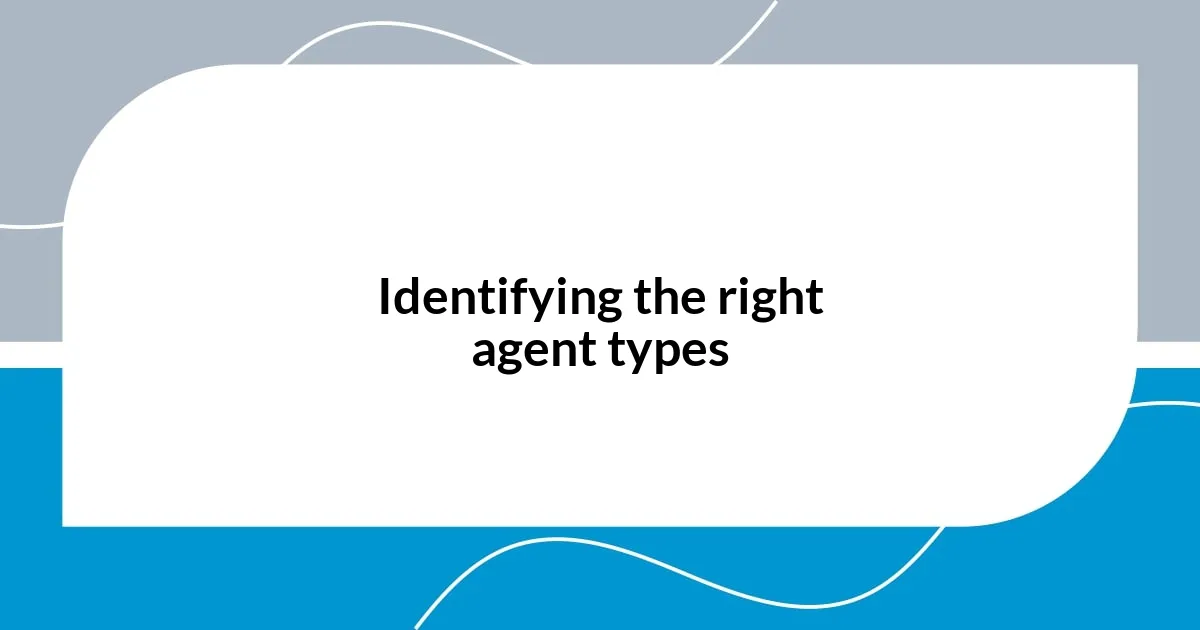
Identifying the right agent types
Identifying the right agent types was quite the journey for me. I vividly remember the excitement mixed with apprehension when I realized how different agents specialize in varying aspects of the industry. What helped me tremendously was developing a simple checklist based on my needs, which guided my search for agents that aligned closely with my genre and goals.
Here’s a useful breakdown of some common agent types you might encounter:
- Literary Agents: Focused on representing authors and their written works.
- Talent Agents: Specialize in representing actors, directors, and other performers.
- Commercial Agents: Work primarily with sectors like business, advertising, and public speaking.
- Film Agents: Deal specifically with film rights and screenplay adaptations.
- Foreign Rights Agents: Assist in selling rights to publishing houses in other countries.
Reflecting on my experiences, I found that understanding these different roles not only clarified my own path but also empowered me to make informed decisions as I navigated the complex world of representation. It’s amazing how knowing the specifics can turn a daunting task into a more manageable one, creating a sense of direction amidst the overwhelming options.
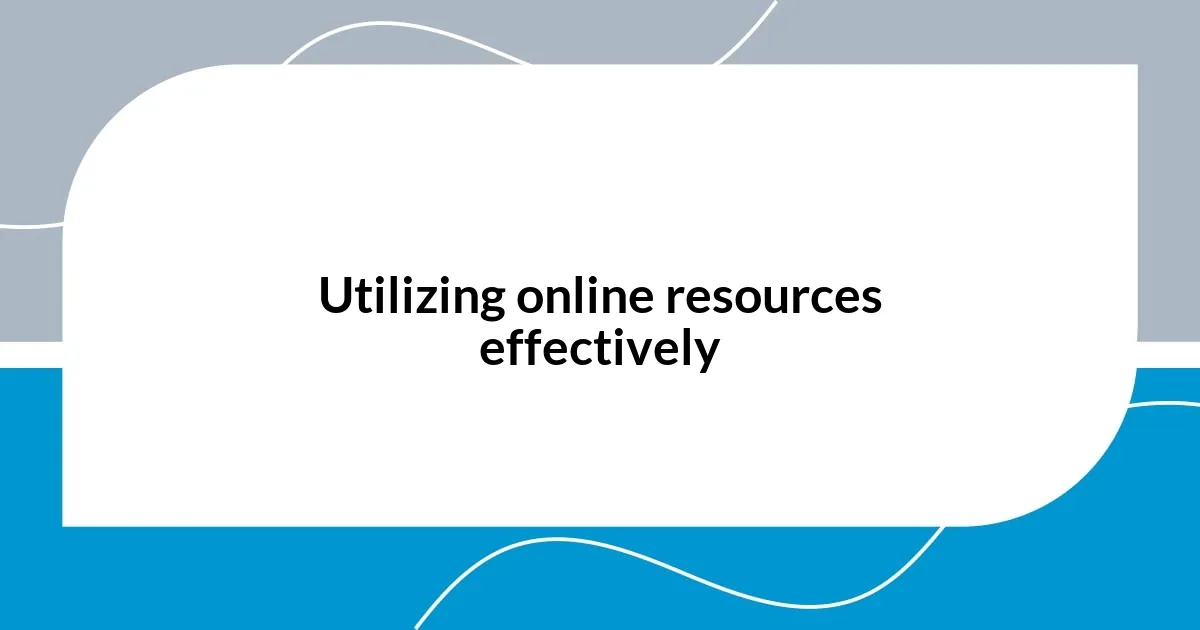
Utilizing online resources effectively
Utilizing online resources effectively has been a game changer for my agent research process. I recall a moment when I stumbled upon an online database that categorized agents by genre and submission guidelines. It felt like hitting the jackpot! This resource not only saved me hours of searching but also allowed me to focus on the agents who were genuinely interested in my work. By using platforms like QueryTracker or Manuscript Wish List, I could see what agents were asking for, which informed my approach and gave me a clearer path.
Another crucial aspect of utilizing online resources is engaging with social networks and forums. I vividly remember joining a writers’ group on Facebook where members shared their experiences with different agents. One member even offered insights into a particular agent’s personality, which helped me determine if they’d be a good fit for me. These community-driven platforms can provide invaluable peer feedback and sometimes even lead to personal recommendations. It’s incredible how a little digital networking can transform your research efforts into thriving connections.
Lastly, keeping an organized tracking sheet of my findings was vital. When I first started researching, I would find myself overwhelmed with information and forgetting which agents fit my criteria. By creating a simple spreadsheet to log each agent’s details, submission requirements, and any notes from my research, I navigated the process much more efficiently. It reminded me that even as I connected online, maintaining organization in my research was just as crucial in making those connections meaningful and actionable.
| Resource Type | Benefits |
|---|---|
| Online Databases | Streamline agent search with categorized listings; saves time and directs focus. |
| Social Networks | Offers peer insights and informal recommendations; aids in building community connections. |
| Tracking Sheets | Keeps research organized and accessible; enhances efficiency in follow-ups and submissions. |
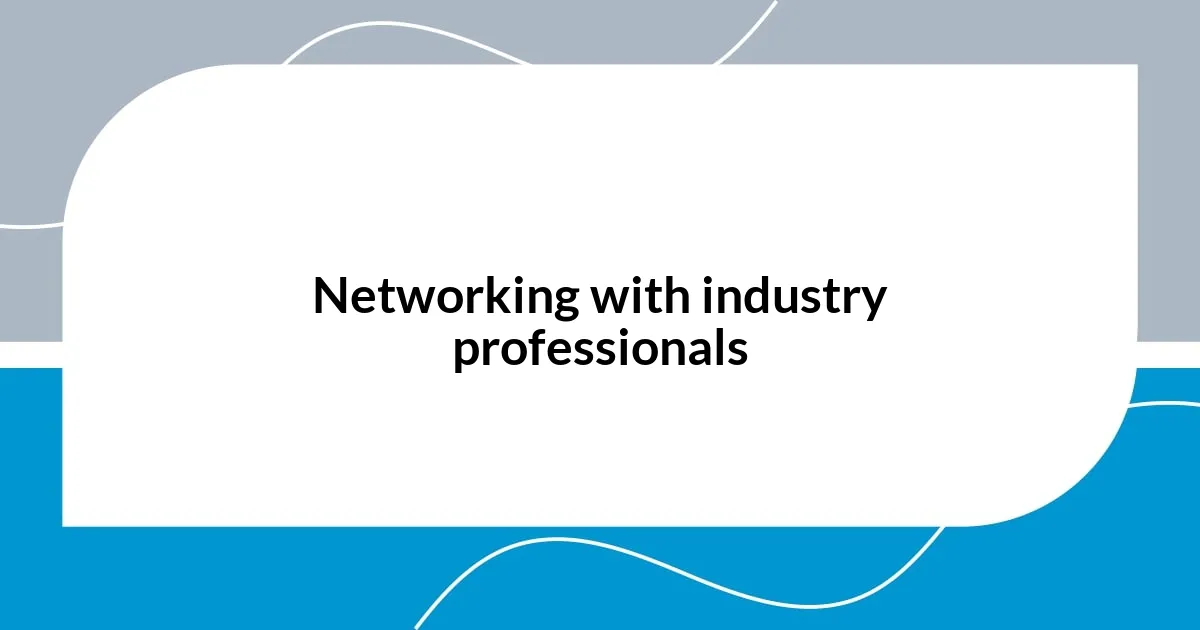
Networking with industry professionals
Building connections with industry professionals has been a pivotal part of my journey in researching agents. I vividly recall attending a local writing event where I mingled with seasoned authors and agents. It was exhilarating to hear their stories and experiences firsthand; you never know who might have the perfect insight or connection that could change your trajectory. Have you ever felt that spark of inspiration when conversing with someone who truly gets your passion? I certainly did that day.
I quickly learned that networking is not just about shaking hands but fostering genuine relationships. After that event, I made it a point to follow up with people I met. A simple thank-you email or a connection request on LinkedIn can go a long way. I can still remember how one agent responded warmly, sharing valuable tips on how to fine-tune my query letter. This underscores the importance of being approachable and open to interaction – you never know what kind of opportunities can arise from a single conversation.
Another enriching experience was when I joined a local writers’ workshop. The camaraderie among the participants was infectious, and we often discussed our progress and hurdles. I was amazed at how many contacts others had within the industry! It highlighted for me that networking can be as simple as just being part of a community. Have you thought about how a supportive group can enhance your research? For me, realizing that collaboration often opens doors that I couldn’t have accessed alone was a real eye-opener, emphasizing the collective power of a network in this competitive field.
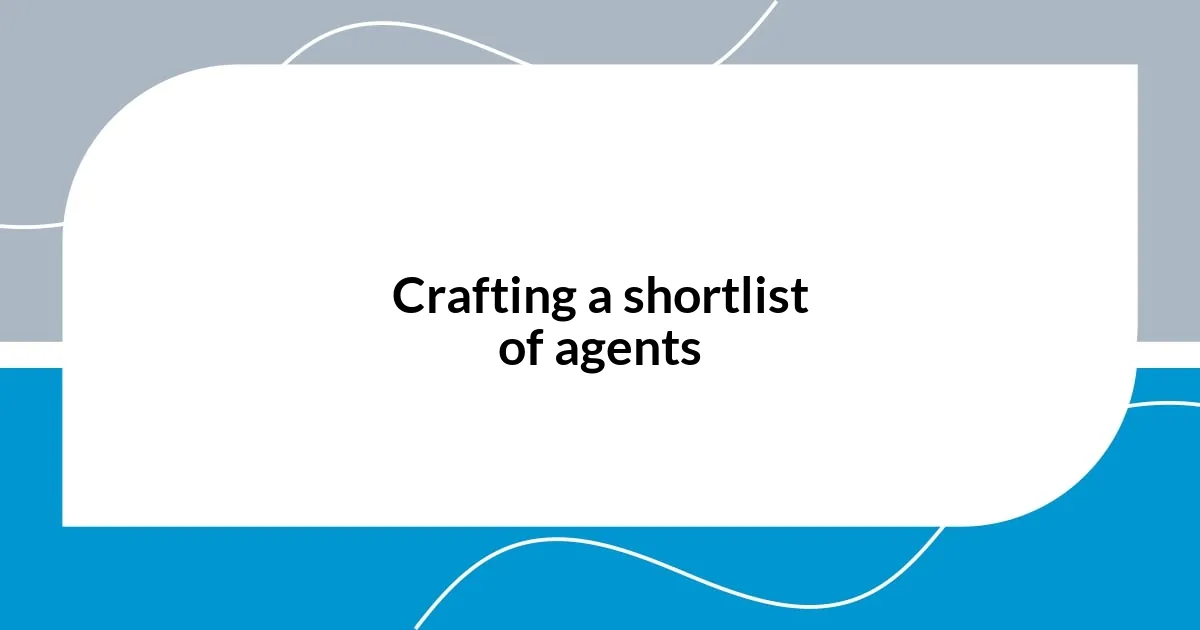
Crafting a shortlist of agents
When crafting a shortlist of agents, I found that being specific about my goals made all the difference. I remember sitting down with a cup of tea, reflecting on my manuscript’s genre and target audience. It felt empowering to identify agents who not only represented my genre but had a track record of success with authors similar to me. What does your ideal agent look like? For me, it was essential to narrow down my criteria, which helped create a focused and much less daunting list.
It’s also crucial to delve into each agent’s submission guidelines and preferences. I distinctly recall a moment when I almost submitted to an agent only to notice their clear stance against unsolicited manuscripts. This oversight could have wasted my time and credibility! Taking the time to read their bios, personal blogs, or social media can reveal passions and preferences that aren’t always highlighted in their official listings. Isn’t it fascinating how a little extra research can clarify compatibility?
Finally, I found it beneficial to keep an evolving shortlist. When I first began, I was zealous and created a long list, only to realize I was trying to juggle too many at once. After some trial and error, I trimmed that list down to a select few and updated it regularly based on new insights and feedback from others. Reflecting on my last iteration of the list, I felt more confident—and it set me up for better follow-up opportunities with agents who truly resonated with my work. How do you feel about streamlining your agent search? It can turn what feels like an overwhelming task into a strategic, manageable journey.
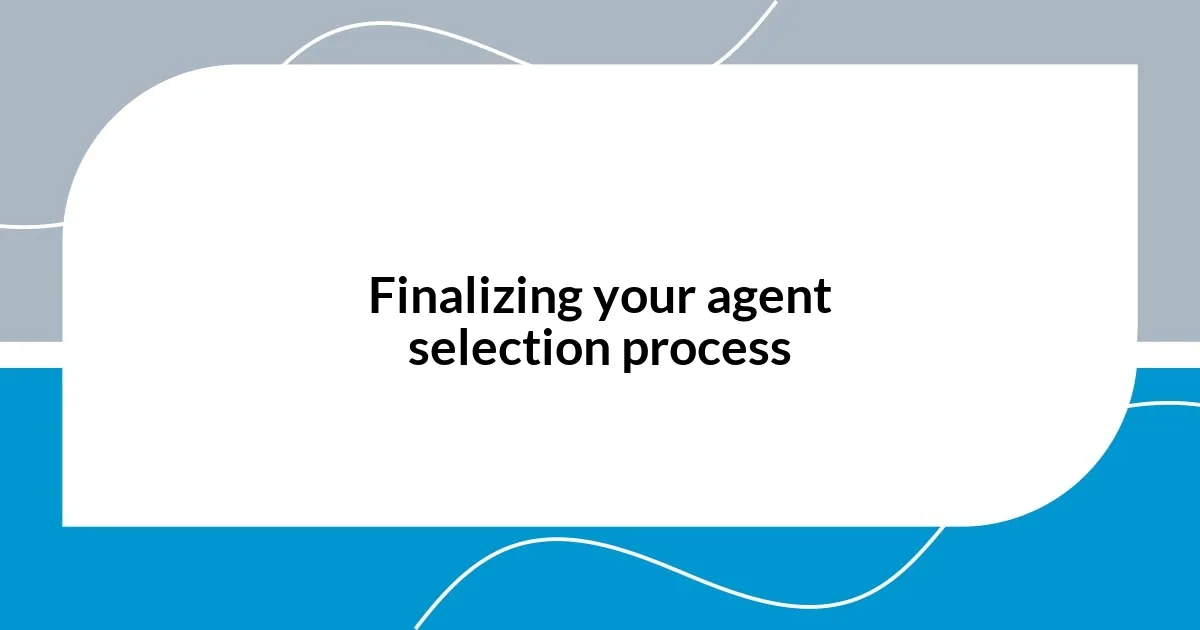
Finalizing your agent selection process
As I approached the final stages of selecting my literary agent, emotions ran high; I wanted this decision to be spot-on. I remember sitting in my favorite nook, piles of notes and printed bios scattered around me, and feeling that mix of excitement and anxiety. This was not just about picking a name off my shortlist—it was about finding someone who truly understood my voice and vision. Have you ever felt that weight of responsibility in making an important choice, knowing it could alter your career path? I certainly did, and it pushed me to dig even deeper.
While contemplating my final choices, I started reaching out for informal chats with a couple of my top picks. I found that speaking directly to agents was illuminating; it offered a chance to gauge their personality and compatibility. One conversation with a potential agent left me energized. Their passion for my genre was palpable, and their thoughts on my work felt like a breath of fresh air. It struck me then: how important it is to find someone who doesn’t just want to sell your book but believes in it. Have you thought about what you need most in that relationship? It’s not always about the biggest name—sometimes, it’s about the right fit.
After these discussions, I reconsidered my priorities. I felt a transformative shift in how I viewed the process. I realized that a genuine connection mattered more than checking boxes against an agent’s credentials. With my newfound clarity, I felt ready to make an informed decision, nestling into the understanding that partnership with an agent is the beginning of a collaborative journey. Are you prepared to embrace that connection? It’s crucial to select an agent who you can trust to stand by your side as you navigate the unpredictable waters of publishing.